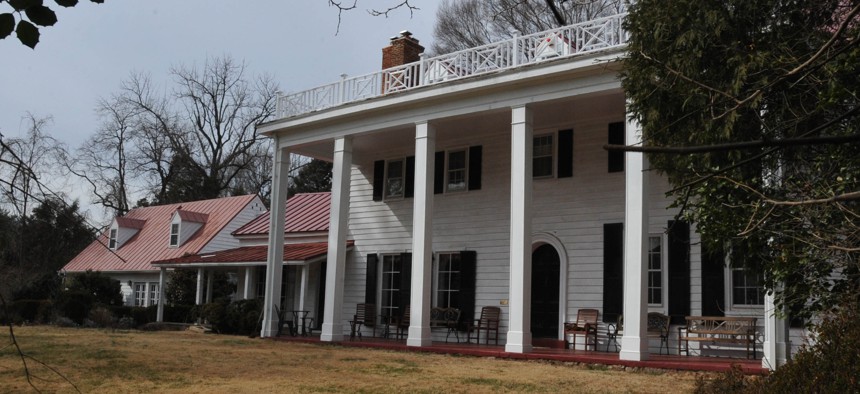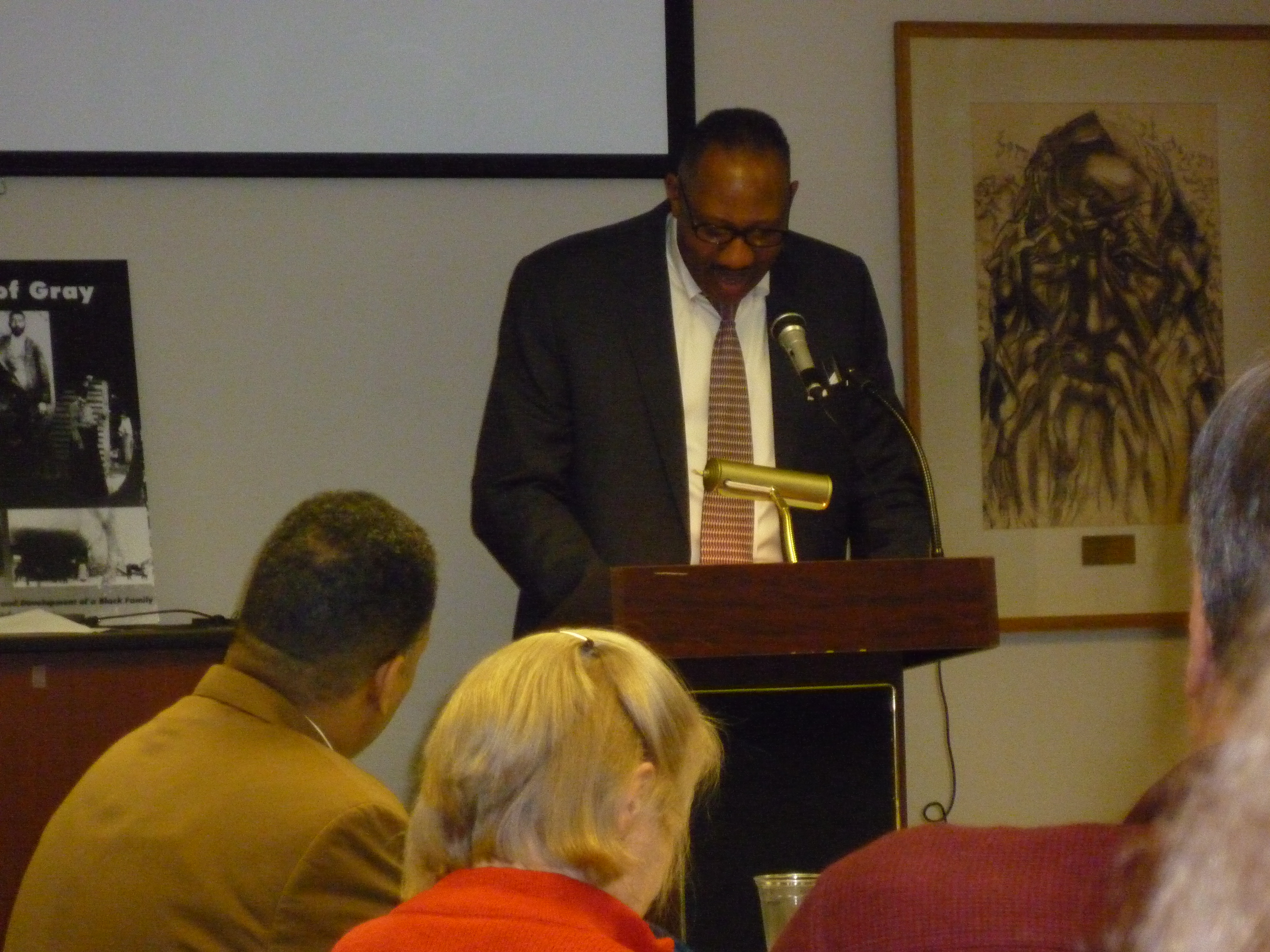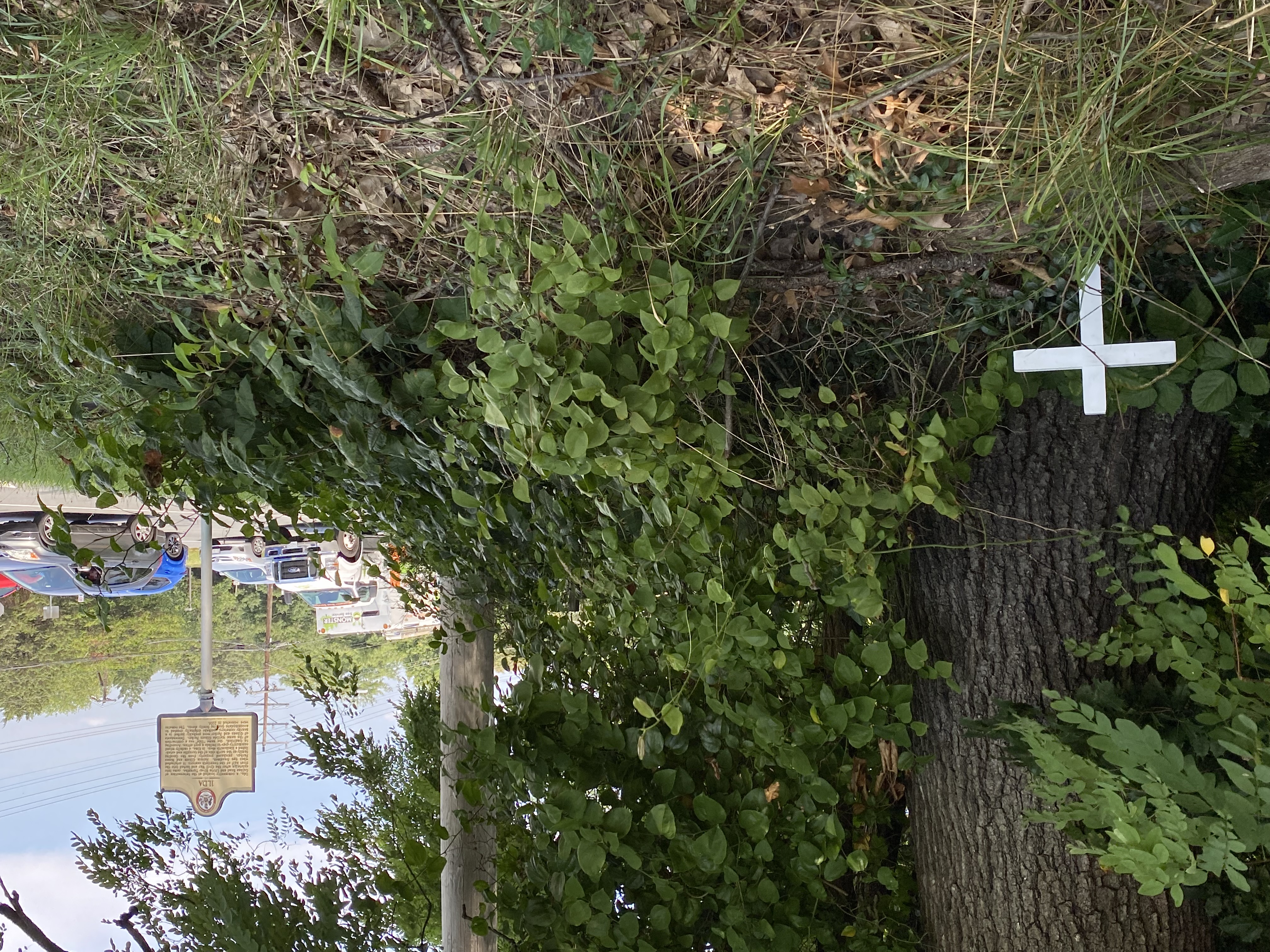The Plantation and the Pizza Hut: A Suburban County Reconsiders Its History

Oak Hill Plantation House, Annandale, Virginia Jerrye and Roy Klotz, M.D./Wikimedia
Fairfax County, Virginia wants to add unheard voices to its story. That will require changing the way it gathers and evaluates historical information.
On Nov. 5, 1861, Pvt. Edward S.E. Newbury and Cpl. Thomas Edwards of the Third Infantry Regiment of the New Jersey Volunteers went on a scouting mission to Oak Hill, a plantation house in Annandale, Virginia, outside Washington, D.C. They’d heard that a group of Confederates were gathering at the house, whose owner had left the property due to its precarious location in the no man’s land of northern Virginia.
Newbury and Edwards made their way to the house, where they encountered an enslaved Black woman who was tending to her ill son. From her, they learned that the home’s owner was expected to return that evening. The two men hid in the house’s detached kitchen, and as night fell found themselves in a firefight. Edwards was shot in the back, and he and Newbury fled to a nearby cornfield. Newbury eventually set off to find a source of water.
Along the way, he walked across what is now my not-so-manicured suburban lawn.
Actually, there’s no way to know for sure whether Newbury did or not. But he certainly came close. My wife and I live within easy walking distance of Oak Hill, and an 1862 map indicates the presence of a field where our house now sits—with a yard that backs up to a stream. Oak Hill, built around 1790, is not lost to history. It’s still standing, although a series of renovations have altered its original look. And it's still a privately owned and occupied residence—a plantation house smack in the middle of a Fairfax County subdivision.
In 2004, county officials entered into a unique arrangement with Seville Homes, the developer that then controlled the property, under which the county paid $730,000 for an historical easement. It requires the owners of the house to preserve its past, and open it to the public every year. These “Oak Hill History Days”’ are festive affairs, with costumed volunteers, music, children’s activities and presentations with historical information such as the fact that Thomas Jefferson stayed at the home multiple times during his presidency.
Last year, the open house requirement was met through a video virtual tour due to the pandemic.
“The property is an anomaly within the development of Northern Virginia,” the narrator of the video intones. “This colonial gem is quietly set back from busy roads with 200-year-old boxwood bushes lining a driveway that leads up to the property.”
Elsewhere in the video, though, James Walkinshaw, a representative on the Fairfax County Board of Supervisors whose district includes Oak Hill, delivers a more sobering message. “As we appreciate the architecture of the home, and the natural beauty of the site, we also acknowledge that human beings were held here in bondage,” he says. Walkinshaw then reads the names of 41 enslaved people who were listed among the property on the plantation in 1856.
The United States is in the midst of an awakening about its history, especially when it comes to issues of race. That’s playing out at the national level, in state capitals, at county and municipal government offices, and at sites like Oak Hill and another historic community nearby whose centerpiece was eventually replaced by a Pizza Hut.
Fairfax County officials have pledged to add more Black voices to its story. That won’t be easy, and will require a new approach to how its history is researched and interpreted.
Minor Miracle
It’s easy to miss Oak Hill, which is hidden away from the roads that border it. Even its current owner, Joe Braceland, who was born in a hospital not far from the neighborhood and has lived in Fairfax County his entire life, was unaware of Oak Hill’s existence until shortly before buying the property with his wife, Laura.
”I’ve been going down the roads that border this property for decades,” he says in the video. “Didn’t know it was here.”
It’s a minor miracle the house wasn’t razed (or deliberately burned down) in the development of this particular tract of suburbia in the early 1960s, and has escaped the wrecking ball since. Merely declaring that a site is of historic significance does little to protect it. “You can name something an historical property up the ying yang, but people can still develop it,” says Sharon Bulova, who orchestrated the easement on Oak Hill when she served on the Board of Supervisors. Bulova also organized a project to record the history of the county’s Braddock District, in which Oak Hill is located, in the early 2000s.
By 2008, even after the historical easement was in place, Oak Hill had fallen into disrepair and the house was damaged by vandals. It was eventually sold at auction and rehabilitated. Since then, a succession of owners have upheld the commitment to its preservation.
In 2010, the Oak Hill History Day focused on the African-American experience, with presentations on research into enslaved people and their experiences on the plantation. But beyond that one-off event, their story hasn’t attracted anywhere near the attention paid to that of its white owners.
“We’re recognizing that there is a much fuller history to tell,” Walkinshaw said in an interview with Route Fifty.
“It’s like opening a door to a new world,” says Bulova. “There’s a whole population that we haven’t paid attention to. We haven’t gathered that history like we should.”
“We’re looking at these things in so many different ways, with more voices being brought in,” says Maddy McCoy, who runs a public history consultancy and has done extensive research on the people who lived at Oak Hill and the surrounding community. “I’m going to be very frank: It’s not just a bunch of white people anymore looking at things from a white lens.”
Lost Community
If you’re among the many people who drive past Oak Hill heading west on Braeburn Avenue without noticing it, about a half mile later you probably won’t miss a sign that says ILDA POOL. You might assume that ILDA is an acronym related to the swimming complex, or that you’d somehow stumbled upon the International Laser Display Association, but neither of those would be true. Ilda is the name of a long-disappeared community whose history is linked to, and distinctly different from, that of Oak Hill.
Ilda was founded after the Civil War by Moses Parker and Horace Gibson, two formerly enslaved men who were trained as blacksmiths and managed to purchase their freedom. They bought land on Little River Turnpike and opened a blacksmith shop. Soon, business was thriving and their landholdings steadily grew. Ilda’s name, according to local lore, was a contraction of the name of Gibson’s daughter, Matilda.

Ilda grew into a bustling community—and a racially integrated one at that. Dennis Howard, a descendant of Horace Gibson who exhaustively researched his family’s history in and around Ilda before his death in 2018, said in a 2005 oral history interview that his ancestor “served everybody—black, white, poor, and rich.” The Little River Turnpike location was a savvy choice, he added, because of its proximity to the Fairfax County Courthouse.
The Alexandria Gazette, the most prominent northern Virginia newspaper in the late 1800s, is filled with references to Ilda, from the consequential (news of a “mass meeting” to back a proposed road construction project) to the mundane (“It has been whispered around town that one of our young Ilda farmers will lead to the altar one of Alexandria’s beauties”).
But if it weren’t for the dogged efforts of Howard and another Parker-Gibson relative, Hareem Badil-Abish, who wrote a detailed family history in the mid-1990s, Ilda might have been erased from memory. Unlike Oak Hill, the Ilda community, which thrived well into the 20th century, has all but vanished. On the site of the blacksmith shop sits a Japanese restaurant that was until recently a Pizza Hut. It’s surrounded by a Shell station, a CVS and a 7-Eleven.
More than 40,000 vehicles a day speed by on Little River Turnpike, cars jockeying for position with gasoline trucks heading back and forth from a fuel storage depot just down the road. For a pedestrian, it’s difficult to navigate the car-centric area, and impossible to imagine what it was like more than a century and a half ago.
Car traffic, in a way, contributed to the fact that Ilda is remembered at all. In 2004, the Virginia Department of Transportation initiated an effort to add a right turn lane at the intersection of Little River Turnpike and Guinea Road—an area that had not only been part of Ilda, but may have been home to slave quarters before the community was established.
Howard informed the transportation agency what he had been telling various county officials since 1988---that his research indicated the location contained a cemetery in which his ancestors were buried. What followed next is laid out in a foot-high stack of documents housed at the Fairfax City Regional Library.
VDOT commissioned an archaeological study of the site, which uncovered remnants of coffins and human remains consistent with those of African Americans who had lived “a life consisting of heavy physical labor.” In 2006, the remains were carefully removed and relocated to nearby Pleasant Valley Cemetery, where a sign now explains their significance. Likewise, a roadside marker at the Guinea Road cemetery intersection provides a brief history of Ilda. The whole effort “makes history inclusive, rather than exclusive,” said Howard in April 2006.
But he had to fight a long, lonely battle to get that history recognized. “Because it had been an African American site, it just did not get the amount of respect that it should have throughout any process at any given time,” says McCoy, who conducted historical research on the site as an intern at the Fairfax Library. Much of the information about the site came in the form of oral history, and in official government proceedings, she says, “oral history means jack if you don’t have documentation—which is a huge part of this discrimination.”
Now, other than the roadside sign, the only trace of the historic cemetery, in which many more people might be buried than those whose remains were found, is a small cross someone has placed in the underbrush beneath a tree.

‘Wall of Unknowing’
As convulsive shocks around issues of race have reverberated throughout the nation recently, Fairfax County has moved to change the way it preserves and honors its history. It has renamed schools, and in November 2020 removed a monument to John Quincy Marr, the first Confederate soldier killed in the Civil War, from the grounds of the county courthouse.
At that time, the county’s History Commission was putting the finishing touches on a board-ordered report “listing a full inventory of Confederate street names, monuments and public places in Fairfax County and on Fairfax County-owned property.” In early December the commission delivered its study. It’s 539 pages long—and even at that only includes “generally known individuals,” because “in many cases, there will be no means of verifying whether a common last name, i.e., Johnson, refers to a Confederate.”
The commission ended up examining 26,500 assets, painstakingly analyzing their heritage. Now it’s up to the Board of Supervisors to decide what to do with the data—including the dozens of streets and places named after Robert E. Lee and Stonewall Jackson alone.
The History Commission also launched an effort to create an African American History Inventory, including physical sites, collections, digital resources, oral histories, church and school histories, roadside markers, family records and objects. “The next step will be to create an interactive, searchable product that combines all the information,” says commission member Mary Lipsey, who has written about Oak Hill and participated in the effort to recognize the Guinea Road cemetery.
Telling a fuller story, especially of the enslaved, is a big challenge. As a Braddock District Black History Month website notes, “There remain many unknown facts regarding the number, identities, and backgrounds of the slaves due to lack of records. Slaves were not documented in the annals of history like their masters. They had no birth, death, or marriage certificates. Property records, inventories and receipts are some of the only records discoverable in Fairfax County.”
“If you try to trace slaves all the way back,” said local historian John Browne in a 2018 interview, “you run into a wall of unknowing.” Using as many records as he could find, Browne listed the names of enslaved people who lived on the Ravensworth plantation, of which Oak Hill was once a part, in his book, The Story of Ravensworth.
State and local government officials around the country are reevaluating the past, paying more attention to stories that have been discredited as unverified and removing monuments to those who betrayed their country to fight for the right to hold human beings as property. In the process, they’re often accused of erasing history. In fact, says Walkinshaw, “we’re bringing to light a history that has been erased.”
Unrecorded History
For hundreds of years, the light has shone largely on the white experience in America. For example, the story of what happened to Newbury and Edwards is so fully documented that it can be difficult to reconcile the details in conflicting accounts. It does seem clear that after their encounter with Confederate soldiers at Oak Hill, they hid out in the cornfield until 4 a.m. Then Newbury hoisted Edwards onto his back and began a long trek back to their camp in Alexandria, where they arrived around 7 p.m.
But what about the enslaved woman who had helped them? Her name, that of her ailing son, and the story of how they came to find themselves alone at a plantation house in a hotly contested region during the early days of the Civil War, weren’t erased. They weren’t considered significant enough to record at all.






